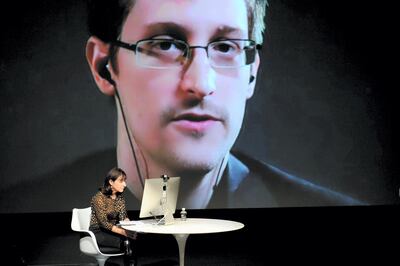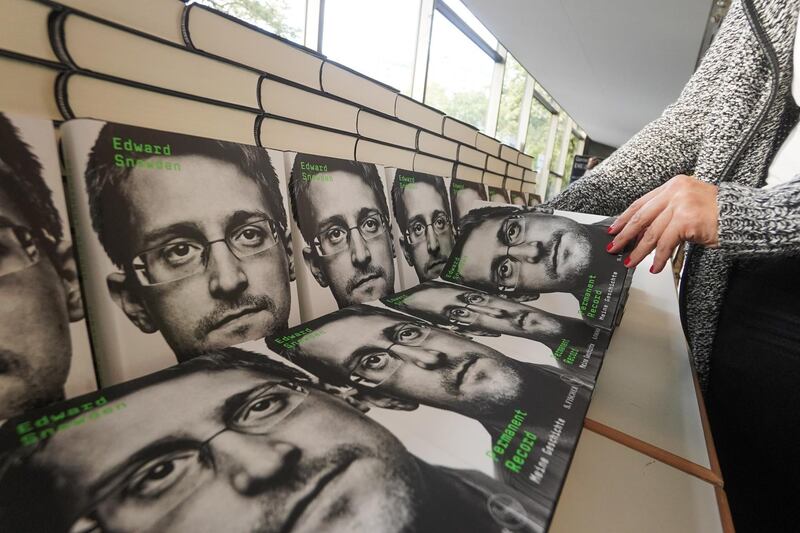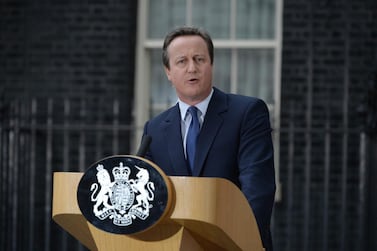David Cameron's memoir only confirms what we already knew – he just doesn't get it.
Last year's most unoriginal birthday present was Michelle Obama's Becoming. This year's is surely whistle-blower Edward Snowden's memoir Permanent Record. This speaks against neither tome. On the contrary, both are excellent reads with plenty of food for thought.
Until recently, Snowdon – a former CIA and National Security Agency employee and contractor who in 2013 exposed the US government's global mass surveillance programme – kept himself in the background.
The essential thing, he repeated, was not Edward Snowden, but the bombshell revelations that he brought to light. The US government, he said, had violated the country's constitution by collecting detailed data about every American, indeed every person in the world.
The US was storing data in massive digital archives forever that could, at any moment, be accessed by the intelligence services.
Snowden's object with this autobiography is really no different. Now 36 years old and living in Russian exile, Snowden attempts to explain the nature of mass surveillance, how it works and how it became possible. The result is an eminently readable and thoroughly engrossing autobiography that explains technical trends and operations in layman's language. Snowden is the very rare computer geek who can write well.
Among other things, it's a damning exposé of the culture of the American intelligence community, which explains in part how it could come to exploit new technology so grossly.
Snowden spends several chapters combing through his childhood and adolescence in North Carolina and Virginia, the son of US government employees, who themselves were children of public servants going all the way back to the Mayflower.
It is during his early years that the young, insecure autodidact discovers his first love: computers and then the internet. Snowden effuses about the early era of the internet in the 1990s when it was wide-open and liberating, free to all and from of what would come next — "surveillance capitalism," he calls it, practised by unscrupulous merchants in their different guises such as Google, Facebook and Amazon, among others.
Lacking a college degree – even his high-school diploma was acquired by passing a standardised exam, not sitting through four years of schooling – Snowden is baffled by the way he and others in their early twenties were hired by the US government's secret services and very quickly given access to sprawling, high-level intelligence. This laxness worsened in the aftermath of the 9/11 terrorist attack, which is where Snowden's story really begins.

So unnerved was the 18-year-old when the attacks occurred that – despite being just 5 foot 9 inches tall and weighing 56 kilograms – he enlisted in the US Army. This didn't last long as he was injured in basic training. But his intention to serve his country was undiminished, which led him to the technical units of the CIA and the NSA, the latter in particular because it had been granted abundant new powers and remits through the post-9/11 Patriot Act.
Snowden describes the first hints he got that the US government could, if it wanted to, engage in mass surveillance rather than the targeted surveillance of individuals that it had carried out in the past. He was based in Japan when the US undertook exactly this kind of spying on China. If they could do it to China, Snowden surmised, they had the capability to do it to their own citizens.
After bouncing between the CIA and NSA, he returned to the US to work (a second time) for Dell, a US technology company, which was one of the many contractors hired by the US intelligence agencies. Snowden rose swiftly and found himself involved in the connecting of intelligence flows and the search for a way to store it in a way accessible to the spy services.
What Snowden stumbled upon shocked and disturbed him to the point of his falling ill for months, unable to work. It was “the closest thing to science fiction I’ve ever seen,” he writes, “an interface that allows you to type in pretty much anyone’s address, telephone number, or IP [internet protocol] address, and then basically go through the recent history of their online activity. … You could read through their emails, their browser history, their search history, their social media postings, everything.”
This confirmed Snowden’s suspicions about what the US was actually up to and, after much personal deliberation, set him on the path to locating hard evidence of mass warrantless spying on American citizens. “The only two countries that I knew of that had previously practised mass surveillance were those of … Nazi Germany and Soviet Russia,” he writes.
Snowden's play-by-play of his search for the smoking gun and the way he smuggled it out of an underground NSA facility in Hawaii, and then his flight abroad, beats any fictional thriller. At one point, rather than tell the story of his girlfriend Lindsay's travails once he goes public with the revelations in Hong Kong (which she knew nothing about until her partner's face and words appeared in the media), he uses excerpts from her diaries, which also makes for scintillating reading.
Since then Snowden (and Lindsay) live in Moscow. He claims that he wants to come back to the US and is willing to stand trial – but not under the current legal conditions that would deny him his opportunity to justify his leaking. Snowden has no regrets; US courts and Congress have since put in place safeguards that make much of warrantless spying and eternal storage of personal information illegal – although he underscores that they were also complicit in the abuses.
The whistle-blower works on digital privacy issues as director of the Freedom of the Press Foundation, an organisation that protects journalists from hacking and government surveillance.
By the reaction of the Donald Trump administration to Permanent Record's publication – a civil lawsuit against Snowden that would recover all proceeds of the memoir – the US government obviously expects it to stay at the top of the best-sellers' list for a while. This year's most unoriginal present is one that everybody should read.







